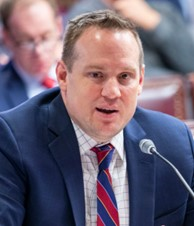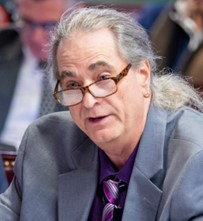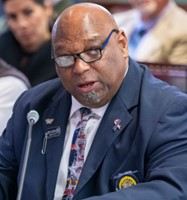March 26, 2024 Policy Hearing Takeaways
March 26, 2024
Regulating Skill Games
The House Gaming Oversight Committee, currently under a Democrat Chairman, has chosen to sit on their hands this session while important issues arise across the state. Republican Gaming Oversight Chairman, Russ Diamond, could not sit idle any longer and requested that Policy Committee hold a hearing on regulating the games of skill that have proliferated across the Commonwealth. On March 26, 2024, the Committee convened a long overdue informational hearing to learn more about these skill games, their impact on our communities, and their future. The day’s hearing was instrumental in shedding light on the complexities of skill game regulation and taxation, crucial for policymakers and stakeholders alike.
The testifiers that joined the Policy Committee were as follows:
Full Hearing: Regulating Skill Games
Michael Barley, Chief Public Affairs Officer, Pace-O-Matic, Inc.
Jim DeLisio, Vice President, Pennsylvania Licensed Beverage and Tavern Association
Cmdr. Stephen Holmes, Commander, American Legion Post 733
Questions for the Testifiers
| ~ Agenda, Bios, & Testimony ~ |
Michael Barley, Chief Public Affairs Officer at Pace-O-Matic, Inc., testified on behalf of the only vetted and legally approved skill games company currently operating in Pennsylvania. Mr. Barley opened by emphasizing the distinction between skill games and the types of games found in Pennsylvania casinos, they are NOT the same. The distinction between skill games and gambling has significant legal precedents, including the Beaver County Court of Common Pleas in 2014 and a recent unanimous decision by the Commonwealth Court in 2023, affirming that skill, not random luck, drives these games.
With approximately 18,000 legally operating Pace-O-Matic games in Pennsylvania, Mr. Barley underscored the revenue these games generate for their host businesses and non-profits —between $30,000 and $50,000 per year per machine. Pace-O-Matic machines are made in Pennsylvania, and 90% of the revenue from the games remains within the Commonwealth. Not all machines we see in our communities are legal and vetted like Pace-O-Matic, there are fly-by-night machines that go by many names, and approximately 50,000-60,000 of these machines exist.
Knowing that their machines are profitable and legal, Pace-O-Matic advocates for taxation and regulation, supporting SB706 and HB2075. Mr. Barley expressed that the machines found throughout Pennsylvania, whether from Pace-O-Matic or another skills game company, should be regulated and taxed to ensure players a fair game and our communities a fair compensation. With projected annual tax revenue estimated at $300 million it is expected that regulation of PA skill games will bring tremendous revenue to the state, so long as they are not regulated or taxed out of existence. Mr. Barley closed his testimony by cautioning against overly high taxes, which could lead to adverse outcomes such as the proliferation of illegal untaxed games and the removal of legal and vetted ones, stressing the importance of a balanced tax approach to capitalize on the popularity and success of skill games moving forward.
 |
| WATCH |
| “90% of the revenue from skill games stays right here in the Commonwealth.” Michael Barley Chief Public Affairs Officer, Pace-O-Matic, Inc. |
Jim DeLisio, Vice President of the Pennsylvania Licensed Beverage and Tavern Association (PLBTA), provided insight from some of the establishments that host skill games. Skill games have brought tremendous revenue to PA bars and taverns, helped to maintain clientele, and provided financial resiliency through trying times. The games have been spreading through the state for more than a decade, but their popularity exploded during COVID as businesses looked for alternative means to make ends meet and retain their customer base. Thanks to skill games, many small mom-and-pop restaurants and bars kept their doors open through some of the most difficult years in living memory.
Not only have skill games enabled businesses to remain open through difficult times, but the revenue has also supported 401(k)s, higher wages for staff, attracted new customers, and provided more stability to seasonal establishments. If these games were to be taxed and regulated it would further benefit our bars, taverns, and restaurants by mitigating the prevalence of illegal games and enabling establishments to advertise the skill games they host. Currently, there is little to no advertising for these games and the presence of illegal games casts a negative shadow on legitimate establishments.
Mr. DeLisio pointed out the pitfalls of previous taxation models, referencing the current Tavern Gaming Licenses with only 39 current licensees statewide, largely due to high taxation rates (65%) and bureaucratic hurdles. The tax on tavern games was set too high, the upfront cost were too much to bear, and the demand was limited so the state has never received the revenue it expected. The same mistakes should be avoided when regulating and taxing skill games. PLBTA further advocated for the inclusion of Video Gambling Terminals (VGTs) in bars and taverns, as it would provide another source of revenue for both the state and the business. PLBTA has been exceedingly happy with the benefits skill games have brought to Pennsylvania bars, taverns, and restaurants, and believe that an acceptable tax moving forward would be between 18% and 22%. PLBTA expressed that this reasonable tax should be on net income once other taxes, deductions, and business expenses have been considered.
 |
| WATCH |
| “Our members should be allowed to offer legal forms of gaming in their establishments to entertain their patrons.” Jim DeLisio Vice President, Pennsylvania Licensed Beverage and Tavern Association |
Commander Stephen Holmes, representing the American Legion Post 733, offered testimony on the transformative role of skill games in supporting his Post and community initiatives. Post 733 hosts Pace-O-Matic skill games, and through agreements with Pace-O-Matic and local coin machine operators the Post needs to do little more than provide a suitable space for the machines. Hosting the machines has been easy and rewarding for the Post and has provided significant benefit to veterans and their community.
Cmdr. Holmes highlighted the diverse community outreach programs enabled by skill game revenue, ranging from support for local scouting and school children to veterans' assistance programs. The revenue from the skill games in American Legion Post 733 have enabled the Post to receive much needed facility upgrades and support a litany of community groups. He stressed that when considering a taxation percentage, the legislature should take a nuanced approach and consider a percentage that accounts for the location of the game, advocating for differentiated tax rates for non-profits like Post 733. Cmdr. Holmes emphasized the vital lifeline skill games provide to organizations like VFWs, American Legion Posts, and veterans groups, particularly during challenging times such as the COVID-19 lockdowns. Without these skill games many businesses, non-profits, and community spaces would not exist today.
 |
| WATCH |
| “Skill games have made a huge difference for my post. I don’t know what we would do without them.” Cmdr. Stephen Holmes Commander, American Legion Post 733 |
The Policy Committee gained valuable insights from the testimonies of industry experts and stakeholders regarding the nature, regulation, and taxation of skill games. The hearing underscored the importance of distinguishing skill games’ place outside of existing law, acknowledged their significant economic and social contributions to businesses and communities across Pennsylvania, and directed the legislature on how best to move forward in regulating this popular pastime. Policymakers will carefully consider the perspectives shared during the hearing to formulate effective regulatory frameworks that encourage both industry and community prosperity for the entirety of the Commonwealth.